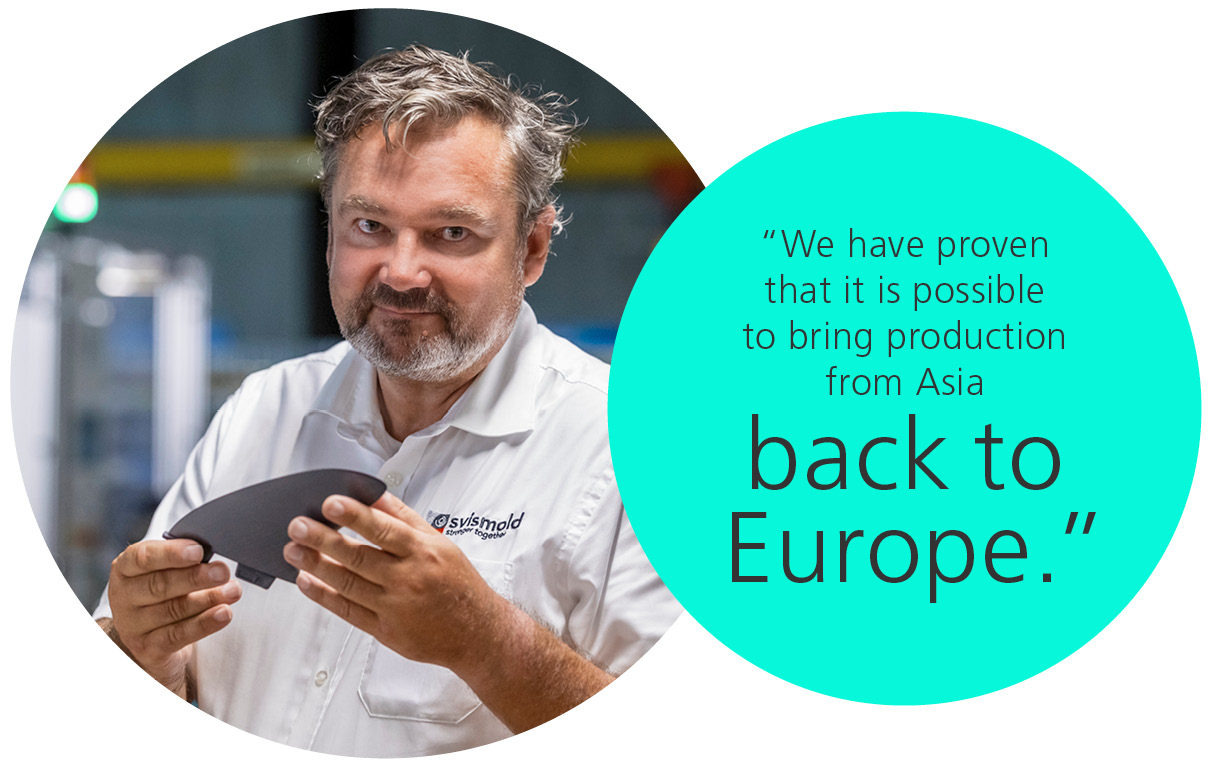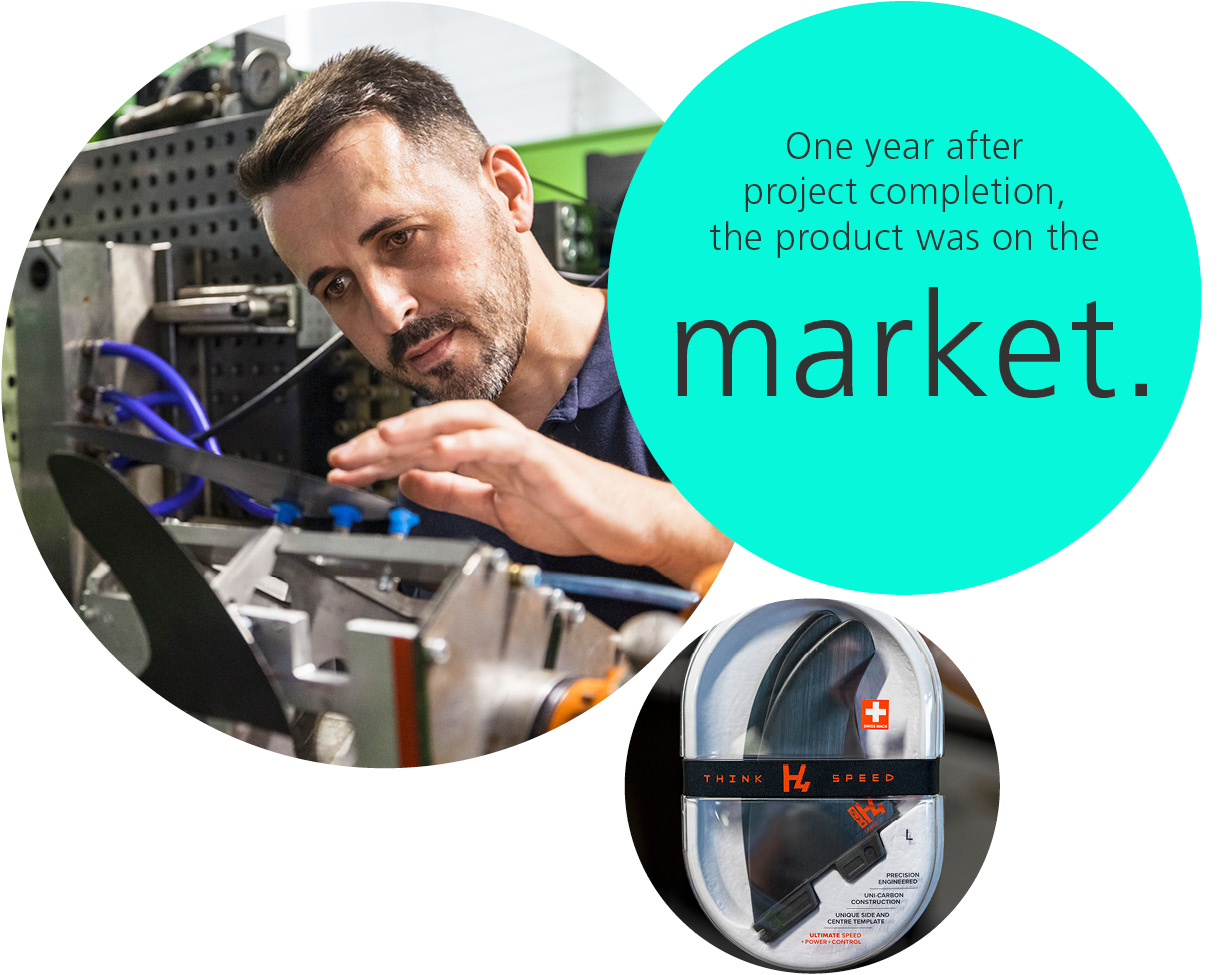Kunststoffwerk AG Buchs has reinvented itself: alongside its world-famous two-metre folding rules, the Rhine Valley-based SME is now also producing surfboard fins. The foundation stone for development of the second pillar was laid by an innovation project of Innosuisse in collaboration with the University of Applied Sciences of Eastern Switzerland. Managing Director Martin Rudolph explains how the traditional company hopes to double its turnover with its new business model.

Kunststoffwerk AG Buchs was founded over 50 years ago. What role has innovation played in your company’s history?
Martin Rudolph: It all started with an innovation back in 1970. Our company’s founder revolutionised the two-metre folding rule. Instead of wood, we used plastic – this made the folding rules more durable. Another milestone was the introduction of composite materials in 2012. To improve the stability of the folding rules, we reinforced them with glass fibres. This represented the first paving stone laid for the road ahead.
If we want to survive as an industrial company in Switzerland, we must develop ourselves further.
Why have you developed your business model further?
Our measuring tools are in demand worldwide, but I am convinced that we must develop ourselves further if we want to survive as an industrial company in Switzerland in the long term. Thanks to our fibre-reinforced folding rules, we already had plenty of experience with composite techniques. We saw great potential in lightweight construction, since lightweight alternatives to metal or plastics are in demand, which is why we decided to offer our expertise to other companies.
Unidirectional tapes – or UD tapes for short – can be used to reinforce plastics. The tapes, which are aligned in parallel, consist of continuous fibres such as carbon or glass fibres and are joined to the thermoplastic base material by means of an injection moulding process. The result: lightweight and strong composite materials that are well suited to lightweight construction – as a substitute for metal, for example.

How did you end up doing business with a sporting goods manufacturer?
That was entirely by chance. We were at a trade fair for composites in Paris and actually had our sights set mainly on the automotive industry. Instead, while there we made contact with Australian company SHI/FCS, the market leader when it comes to surfboard fins for surfing. It quickly became clear that our process with UD tapes would open up new opportunities, and so we developed a product together.
What is it that makes the product a world first?
This is the first surfboard fin to be made using thermoplastic composite technology. When compared with conventional methods, our process offers a number of different benefits. Production is more efficient, and the quality more consistent. The fins are lighter, and we are able to control the characteristics in a more targeted manner. This is crucial since, as is often seen with skis, it is the smallest details that determine how the surfboard responds.
Over the next two to three years, we hope to triple sales with the fins. This would make the new business field just as large as the old one.
The foundations for product development were provided by an innovation project with the University of Applied Sciences of Eastern Switzerland. How did the IWK Institute for Materials Technology and Plastics Processing support you in the period from 2016 to 2019?
Thanks to this collaboration, we were able to scientifically research the material properties for the very first time. In the past, we had relied on trial and error and tinkered on things until they worked. With the folding rules, this had worked out fine, but it was no longer a viable option with a view to possible new fields of application for UD tapes. In order to analyse the mechanical requirements and test out environmental influences over longer periods of time, we relied on the knowledge and infrastructure of the IWK. Over the course of the project, the fin has emerged as the first case of application. One year after project completion, the product was on the market. We probably wouldn’t have dared to do it alone – and if we had, we would never have managed to enter the market so quickly.
What successes have you had since then?
The biggest success for me personally: we have proven that it is possible to bring production from Asia back to Europe so long as you focus as strongly on robotics and process innovation as we are. Our customer had originally sourced all their fins from China. Today, it is proudly marketing the fin we produced with the label “Swiss made”. Sales have got off to a good start, and we have already been able to celebrate a great success from a sporting perspective as well. Filipe Toledo won the 2022 World Surf League using the fin we produced.
How much does the new business model contribute to turnover?
In the first year of production, we achieved a turnover of around one million Swiss francs with the fin. As of right now, we are working on further models and expect to be able to triple sales over the next two to three years. This would make the new business field already just as large as the old one.
Have you patented your process?
We already had a patent for the back-injection of UD tapes. Through the innovation project, this has been joined by five more patents for process, fibre and application technology.
Are you continuing to work together with your research partner?
Yes, we have already completed a further innovation project with the IWK in connection with UD tapes, this time with a focus on foam injection moulding. In our latest project with the IWK, we are investigating the recyclability of the materials. This remains one of the biggest challenges for us. Sustainability is an important building block for our future success.
What do you have planned for the future?
We see our future in lightweight construction and, with this in mind, have launched a new brand. With Svismold, we aim to collaborate with companies from a wide range of industries. Many manufacturers know very little about composites – and this presents an opportunity for us. We have a few interested parties from the bike sector and are running a pilot project with a well-known Canadian sporting goods manufacturer. Our processes could also be of interest to the automotive, aeronautics or toolmaking industries.

Last modification 18.09.2023





